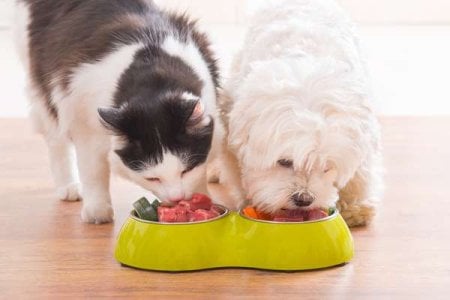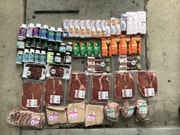Paws-itively surprising: Unearthing the huge pet food myth that's been flying under the radar!
- Replies 4
As we dote on our beloved pets, treating them as cherished members of the family, it's no surprise that we want only the best for them, especially when it comes to their diet.
The pet food industry has seen a significant shift in recent years, with a growing trend that's been wagging tails and raising eyebrows alike.
However, before you jump on the bandwagon, there's a myth that needs debunking, and it could very well impact the health of both your furry companions and your family.
The raw pet food movement has gained traction, with advocates touting benefits such as bolstered immune systems and lustrous coats.
According to research, this trend has exploded into a colossal $214 billion industry, and it's projected to leap even higher to over $300 billion by 2029.
Social media is brimming with pet influencers who enthusiastically share their pets' raw diets, amassing nearly 400 million views under the #rawdogfood hashtag.
It's a movement that's hard to ignore, but according to some experts, it's one that should be approached with caution.

Dr Jamie Geddes, Hospital Superintendent at Sydney Animal Hospitals, sheds light on the matter.
‘It’s not normally something that a vet recommends,’ he said.
‘It’s very popular within the media, but we’re not so aware of the science behind that.’
He explained that while your pets might handle raw diets without apparent issues, the hidden dangers could lurk within your home, posing risks to human family members.
‘Whilst pets may be more tolerant of something like salmonella, as a father of three I don’t want to be feeding my dog raw chicken, and then having the dog lick the faces of my children,’ he stated.
The alternative, as Dr Geddes suggested, is to opt for quality store-bought pet food or even home-cooked meals that are carefully balanced to meet your pet's nutritional needs.
'Making sure whatever you feed your pet has the right nutritional density, vitamin and mineral balance in the right quantities to ensure a healthy skeleton, and of course making sure you're not over or underfeeding your pet are the main things to be aware of,' he advised.
For those pet owners who are keen on taking the reins and preparing meals from scratch, this can be a wonderful way to provide for your pet's dietary needs.
However, Dr Geddes warned, ’There are many ways to ensure you have a happy, healthy pet, and to an extent, feeding a variety of home cooked foods can provide excellent nutrition. It’s definitely not a case of premium pet food being the only way.’
‘The difficult thing can be making sure you get that balance right, and one of the problems I see, particularly sometimes coming from breeders, is that there is a rich cocktail of different supplements some dogs are on, which can lead to overfeeding, because we try and cover off all the different groups in a home-prepared meal.’
If you are opting to buy pet food from the stores, it is important to be very careful and always check them first.
Last year, a batch of cat food was recalled due to unwelcome development in some products. Another product, for dogs this time, was also recalled for the same reason.

Have you tried feeding your pets a raw food diet? What has your experience been, and what advice would you give to fellow pet owners? Share your stories in the comments below.
The pet food industry has seen a significant shift in recent years, with a growing trend that's been wagging tails and raising eyebrows alike.
However, before you jump on the bandwagon, there's a myth that needs debunking, and it could very well impact the health of both your furry companions and your family.
The raw pet food movement has gained traction, with advocates touting benefits such as bolstered immune systems and lustrous coats.
According to research, this trend has exploded into a colossal $214 billion industry, and it's projected to leap even higher to over $300 billion by 2029.
Social media is brimming with pet influencers who enthusiastically share their pets' raw diets, amassing nearly 400 million views under the #rawdogfood hashtag.
It's a movement that's hard to ignore, but according to some experts, it's one that should be approached with caution.

Dr Jamie Geddes warned against the raw pet food trend, highlighting potential health risks for both pets and humans. Credits: Shutterstock
Dr Jamie Geddes, Hospital Superintendent at Sydney Animal Hospitals, sheds light on the matter.
‘It’s not normally something that a vet recommends,’ he said.
‘It’s very popular within the media, but we’re not so aware of the science behind that.’
He explained that while your pets might handle raw diets without apparent issues, the hidden dangers could lurk within your home, posing risks to human family members.
‘Whilst pets may be more tolerant of something like salmonella, as a father of three I don’t want to be feeding my dog raw chicken, and then having the dog lick the faces of my children,’ he stated.
The alternative, as Dr Geddes suggested, is to opt for quality store-bought pet food or even home-cooked meals that are carefully balanced to meet your pet's nutritional needs.
'Making sure whatever you feed your pet has the right nutritional density, vitamin and mineral balance in the right quantities to ensure a healthy skeleton, and of course making sure you're not over or underfeeding your pet are the main things to be aware of,' he advised.
For those pet owners who are keen on taking the reins and preparing meals from scratch, this can be a wonderful way to provide for your pet's dietary needs.
However, Dr Geddes warned, ’There are many ways to ensure you have a happy, healthy pet, and to an extent, feeding a variety of home cooked foods can provide excellent nutrition. It’s definitely not a case of premium pet food being the only way.’
‘The difficult thing can be making sure you get that balance right, and one of the problems I see, particularly sometimes coming from breeders, is that there is a rich cocktail of different supplements some dogs are on, which can lead to overfeeding, because we try and cover off all the different groups in a home-prepared meal.’
If you are opting to buy pet food from the stores, it is important to be very careful and always check them first.
Last year, a batch of cat food was recalled due to unwelcome development in some products. Another product, for dogs this time, was also recalled for the same reason.
Key Takeaways
- Dr Jamie Geddes, a Sydney veterinarian, cautioned against the raw pet food trend despite its popularity, highlighting potential health risks for both pets and their human family members.
- The global raw pet food industry is valued at an estimated $214 billion as of 2022, with expectations to grow to over $300 billion by 2029.
- Dr Geddes noted the importance of ensuring pets' dietary needs are met with the right nutritional balance in store-bought or home-cooked meals.
- Pet owners were encouraged to be cautious of over-supplementation, and to strive for a balanced diet when preparing home-cooked meals for their pets.
Last edited:







